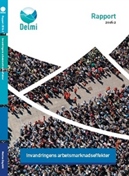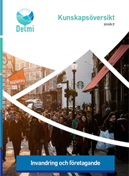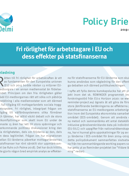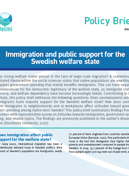The question of what effects immigration has on Sweden's current and future economic development has gained an increasingly prominent place in the public debate. Sweden's population is already today over half a million people bigger than what previous forecasts predicted, which has significantly changed the population structure. The previous forecast pointed to a very sharp increase in the number of older people as the large forty-something generation aged, which in turn would increase the dependency burden on those of working age. That scenario will not materialize, but immigration has significantly changed the Swedish population structure. Therefore, we need greater and more multifaceted knowledge about what the effects of immigration will actually be in order to be able to formulate a policy that addresses the challenges.
Some overall conclusions and recommendations
- With the large increase in population that took place in 2000-2014, the demographic future prospects have changed and improved significantly. The results indicate that Sweden's annual growth rate today is half a percentage point higher than it would have been if Statistics Sweden's forecast from 2000 had been correct.
- The study indicates that the stronger population increase, as a result of greater immigration, has raised housing prices significantly during the 2000s and one can expect a faster price development also in the coming years.
- The feared shortage of people of working age is no longer a problem. The challenge is instead to organize society so that the large working-age population benefits fully.
- One recommendation is to invest in infrastructure, housing, education, security and social measures as soon as possible. It can give both new arrivals, former immigrants and Swedish-born good opportunities to realize their life plans in terms of work, family and housing.
- Another recommendation is close monitoring of the outside world and making long-term population forecasts, as these form the basis for how politicians and decision-makers can plan for the future.
About the report authors
The report, The effects of immigration on Sweden’s economic development (2016:8), is written by Bo Malmberg, professor at the Department of Cultural Geography at Stockholm University, Thomas Wimark and Linn Axelsson, both PhDs. at the Department of Cultural Geography at Stockholm University, Jani Turunen, Ph.D. at the Department of Sociology, Department of Demography at Stockholm University.
Picture by Maxime Agnelli from Unsplash.






